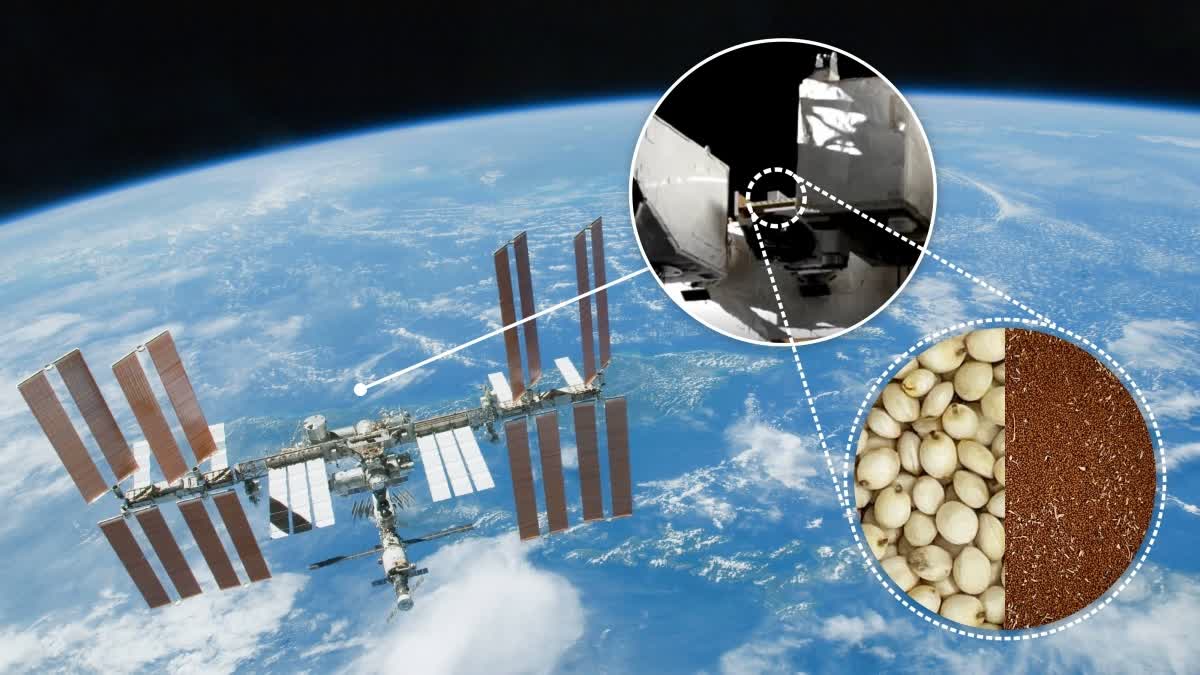Hyderabad: A study of exposing two plant seeds to cosmic rays underway at the International Space Station (ISS), which is expected to help boost global food security, will reach the second stage with the arrival of the seeds from space next week in April. The seeds will be screened for useful traits and identifying new varieties.
International Atomic Energy Agency (IAEA) head Rafael Mariano Grossi said the scientific study could have a real impact on people’s lives in the not-too-distant future. Grossi said it would help grow stronger crops and feed more people, amid world population growth projection suggesting it to breach 10 billion by 2050.
The agencies involved in the study said there is a clear need for innovative solutions through science and technology aimed at producing more food, as well as crops that are more resilient and farming methods that are more sustainable, as reported by the the IAEA.
What's new? Since 1946, such experiments have been carried out. This is the first time that the IAEA and the UN Food and Agriculture Organization (FAO) are conducting an astrobiology project. The study aims to develop new crops which can adapt to climate change and help boost global food security. In another first, the DNA of these seeds will be compared to the ones grown under laboratory conditions at the FAO/IAEA greenhouses and laboratories in Seibersdorf.
-
Why are astronauts growing food in space?@FAO Goodwill Ambassador @Thom_Astro explains why in this podcast 👉🏻https://t.co/fR4v9KwR47#FoodHeroes #SeedsInSpace pic.twitter.com/l9rzPJ4aBc
— Food and Agriculture Organization (@FAO) March 27, 2023 " class="align-text-top noRightClick twitterSection" data="
">Why are astronauts growing food in space?@FAO Goodwill Ambassador @Thom_Astro explains why in this podcast 👉🏻https://t.co/fR4v9KwR47#FoodHeroes #SeedsInSpace pic.twitter.com/l9rzPJ4aBc
— Food and Agriculture Organization (@FAO) March 27, 2023Why are astronauts growing food in space?@FAO Goodwill Ambassador @Thom_Astro explains why in this podcast 👉🏻https://t.co/fR4v9KwR47#FoodHeroes #SeedsInSpace pic.twitter.com/l9rzPJ4aBc
— Food and Agriculture Organization (@FAO) March 27, 2023
Which seeds were sent to space? The present study comprises two seeds - rabidopsis, a type of cress, and sorghum, a type of millets which is also a drought and heat-tolerant grain. Both the seeds were sent in an uncrewed cargo shuttle from NASA on Nov. 7, 2022. They were exposed to a complex mixture of cosmic radiation, microgravity, and extreme temperatures, inside and outside the ISS.
What next? The cargo which is ready for harvest will arrive here in Earth next month. The scientists at the Joint FAO/IAEA Centre of Nuclear Techniques in Food and Agriculture would germinate the seeds which will be later screened for useful traits.
This will help in better understanding of space-induced mutations and identifying new varieties, the study group said. Multiple analyses will be undertaken on the germinated seeds which will go into whether cosmic radiation and harsh space conditions will help these crops becoming more resilient, the group said.
FAO Director-General Qu Dongyu said: "I am very proud of our partnership with IAEA, bearing fruits both on Earth for years, and now with seeds that travelled through space. I am in awe of the resilience of nature, and excited by the endless benefits that space exploration can bring to transform our agrifood systems to be more efficient, more inclusive, more resilient and more sustainable across the globe."



